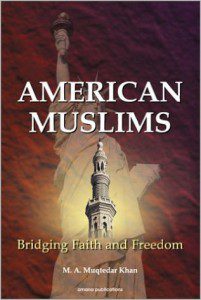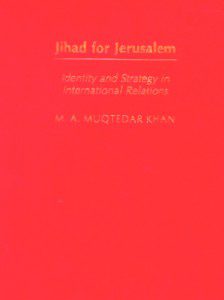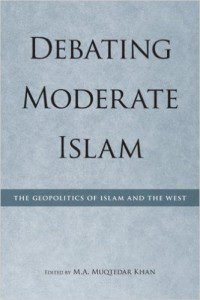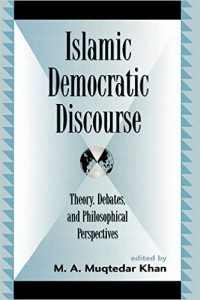 American Muslims
American Muslims
Bridging Faith and Freedom
Copyright: 2002
Publisher: Amana
Summary:
Muqtedar Khan’s American Muslims: Bridging Faith and Freedom is “must” reading for Muslims and non-Muslims alike. Khan identifies and discusses many of the issues of the 21st century that Muslims globally and in America face. Muqtedar Khan’s intelligent, reasoned, self-critical, impassioned and provocative Muslim voice in this collection of articles makes a distinctive and significant contribution to the process of reexamination and reform that has been made even more urgent in the aftermath of 9/11.
– John L. Esposito, Distinguished University Professor, Georgetown University
 Jihad for Jerusalem
Jihad for Jerusalem
Identity and Strategy in International Relations
Copyright: 2004
Publisher: Praeger
Summary:
Jihad for Jerusalem explores the agent-structure dynamics in world politics and advances a constructivist theory of choice that explains the role of identity, culture, religion, and other core values in international politics. The struggle for Jerusalem by Iran, Saudi Arabia, Jordan, and Israel is the empirical space where the dynamics between reason and identity, values and strategies, is explored.
Jihad for Jerusalem advances a theory of agency in international politics. This theory of agency is based on a reconstituted constructivist paradigm. The theory is tested by an examination of the foreign policy decision making of Iran, Israel, Jordan, and Saudi Arabia towards Israel from 1967-1997. The book uses the foreign policy of these states as cases to test the tension between religion and rationality, between identity and reason, between power and morality, and advances a constructivist theory of choice that explains the importance of the role of culture, religion, identity, and core values in international politics. Anyone interested in international relations theory and the convoluted politics of the Middle East, will find this book intriguing reading.
Copyright: 2006
Publisher: Lexington Books
Summary: There is a growing consensus among experts and the educated public alike that democratization will reduce the many problems of the Muslim world. The question that remains is how Islam should be incorporated into the public sphere. Islamic Democratic Discourse is in itself a dialogue that explores the multi-faceted relationship between Islam and democracy. Each chapter, by a preeminent scholar of the Muslim tradition and its contemporary challenges, provides insight into Islamic political thought and its connection to Western democracy. Tamara Sonn and Tarek Ramdan consider the elements of government in classical Islam. Osman Bakar and Ali Paya provide regional studies of the search for compatibility between Islam and democracy. And finally, editor Muqtedar Khan and Marc Lynch are among those who offer a global perspective on the discourse on Islam and democracy. Unlike many recent efforts which seek to either underscore or dispute the compatibility of Islam and democracy, this eclectic collection begins a comprehensive conversation on Islam’s role in the public sphere and charts a course toward an authentic Islamic theory of democracy. Islamic Democratic Discourse is a crucial addition to the libraries of scholars interested in the future of Islam in the modern world.
 Debating Moderate Islam
Debating Moderate Islam
The Geopolitics of Islam and the West
Copyright: 2007
Publisher: University of Utah Press
Summary: After 9/11, many Americans took the view that the attacks on the World Trade Center and the Pentagon were the leading edge of a new war: Islam versus the West. Yet the attacks were also part of the current struggle within Islam between fundamentalist and moderate approaches and were staged for maximum effect in the Muslim world.
